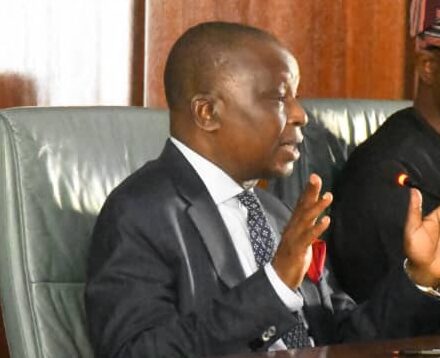By Ebere Agozie
Nigerian organisations experienced 4,388 cyber-attacks per week in the first quarter of 2025, the Minister of Justice, Lateef Fagbemi, SAN, has said.
Fagbemi disclosed this at the Annual Cybercrimes Awareness Campaign and the second National Consultation on the Cybercrimes Legal Framework in Nigeria on Tuesday in Abuja.
The News Agency of Nigeria (NAN) reports that the campaign was titled `Towards a Coordinated and Informed National Response to Cybercrime”.
He said the cyberattacks represents a 47 per cent increase, ranking Nigeria fifth globally in cybercrime and costing about 500 million dollars each year.
“The same networks that empower our lives now serve as battlefields, with criminals using artificial intelligence and sophisticated tactics to deceive and disrupt.
“It defines the new frontier of justice in our time and underscores why we gather today to strengthen our resolve, refine our strategies, and chart a united, informed national response.
“Our theme is not just a slogan; it is a national imperative as the digital domain has become the new battlefield of economic survival, public trust, and national security.’’
The minister reiterated that Nigeria must not stand as a passive observer in this war without borders.
“We must be strategic, coordinated, and relentless since the scale of cybercrime is now a trillion-dollar threat to the global economy.
“INTERPOL’s 2023 Africa Cybercrime Assessment ranked Nigeria among the top ten countries targeted by business email compromise, online fraud, and sextortion.
“These crimes erode public confidence, deter investment, and weaken the digital foundations upon which our future prosperity depends.
“For a nation positioning itself as Africa’s digital hub, this is not merely a criminal justice issue; it is an existential development challenge,’’ he added.
He noted that Nigeria has been deliberate and evolving in its response to the issues of cyberattacks and promised not to relent.
“Through national consultations, we are shaping twin bills: one focused on cybercrime as a criminal justice instrument, and another on cybersecurity governance and critical infrastructure protection.
“Together, they will establish a robust, modern legal architecture that reflects global best practices.
“These practices must align with the Budapest Convention and the United Nations Convention on Cybercrime (2024), and ensures that Nigeria’s digital sovereignty is protected under the rule of law.’’
He, therefore, called for institutional coordination and partnerships, adding that tackling cybercrime is not a challenge that can be outsourced or postponed.
He promised that the ministry would continue to drive reform, coordination, and accountability across the justice sector, ensuring that our legal tools match the complexity of the digital age.
“Let us move from awareness to action, from consultation to implementation, and from fragmented effort to national coherence,’’ he advised.
The Permanent Secretary of the ministry, Mrs Beatrice Jeddy-Agba, admonished all stakeholders to build momentum in the fight against Cybercrime.
“This implies that all of us, across different institutions and sectors, must work hand in hand, our strategies guided by data, knowledge, and best practices.
“As Nigeria becomes more digitally connected, cybercriminals have unfortunately become more sophisticated.
“We have seen a surge in online fraud, identity theft, hacking incidents, and other cyber-enabled crimes that threaten individuals, businesses, and even national security.
“It is our shared duty as leaders and stakeholders to ensure that Nigeria’s cyberspace remains a space of opportunity, trust, and growth, not one of fear or exploitation.’’
NAN reports that present at the event were representatives from the National Assembly, Law Enforcement Agencies, Regulators, the Judiciary and UNODC.
Others were the Private Tech Actors, the Academia, the EU, Civil Society and the diplomatic corps. (NAN)(www.nannews.ng)
Edited by Sadiya Hamza












